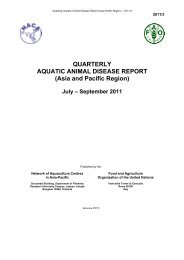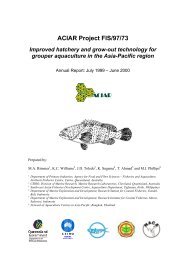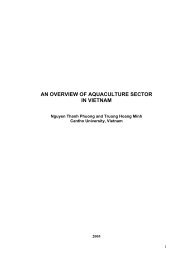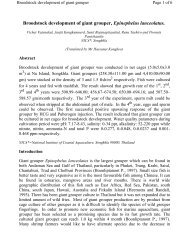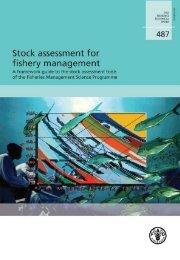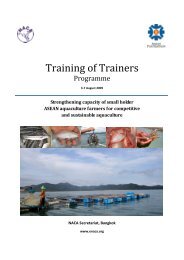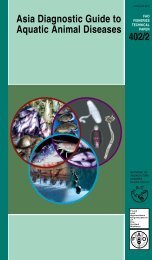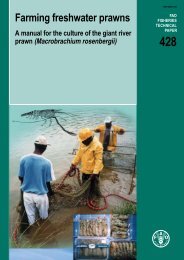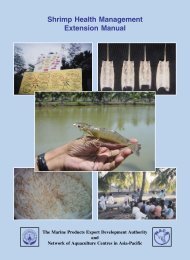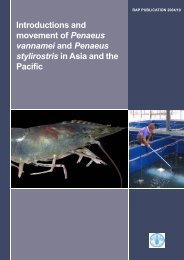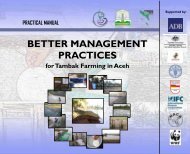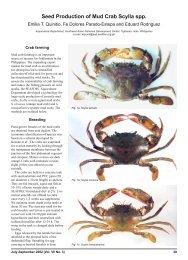Natural factors<strong>Shrimp</strong> diseaseThe outbreak of disease is <strong>the</strong> most prominent nature-based risk factor in shrimp aquaculture,sometimes wiping out entire crops. The more spectacular examples of this were found in Taiwan,Republic of China, in 1988, <strong>and</strong> in China in 1993. In <strong>the</strong> former country, disease led to investor flightfrom shrimp farming, <strong>and</strong> many operations were ei<strong>the</strong>r closed down or converted to o<strong>the</strong>r uses.Disease occurrences can be roughly divided into <strong>the</strong> ones that are environmental <strong>and</strong> opportunistic inorigin, <strong>and</strong> that mainly occur in poorly managed farms; <strong>and</strong> <strong>the</strong> outbreaks that seem to spread to almostall farms regardless of management. The first category is <strong>the</strong> easiest for <strong>the</strong> individual farmer toaddress, but outbreaks require concerted efforts, as described in Chapter 4.The risk of disease outbreaks is related to <strong>the</strong> capacity of <strong>the</strong> individual farmer to manage <strong>the</strong> farm,which can obviously be improved as knowledge of shrimp farming improves. There is also a collectiverisk that arises as soon as one farmer mismanages a farm or introduces disease via seed or feed. Once<strong>the</strong> disease has been established in a region, it can affect relatively well-managed farms just as thoseless well managed. Managing this collective responsibility in an industry that is immature, as it is inmost shrimp farming countries, requires good insight by regulators, as well as farmer associations withsufficient knowledge to limit <strong>the</strong> risk of disease introduction. One of <strong>the</strong> main challenges at this time isto prevent shrimp disease spreading to new frontiers for <strong>the</strong> industry, such as Africa, from <strong>the</strong> maingrowing regions. In <strong>the</strong> medium term, <strong>the</strong>re is also a risk of new African diseases spreading <strong>the</strong> o<strong>the</strong>rway. However, few of <strong>the</strong> farming countries are taking precautions to limit <strong>the</strong>se risks.Wea<strong>the</strong>rAdverse wea<strong>the</strong>r <strong>and</strong> o<strong>the</strong>r climatic conditions can be a risk factor <strong>and</strong> should be considered in <strong>the</strong>design of <strong>the</strong> project. For example, seasonal floods may wipe out production unless <strong>the</strong> construction of<strong>the</strong> ponds takes that risk into account. Low winter temperature, or high summer temperature, can alsostress shrimp. This is a particular problem where farmers attempt two shrimp crops per year, <strong>the</strong>rebysubjecting <strong>the</strong> beginning of <strong>the</strong> first crop <strong>and</strong> <strong>the</strong> end of <strong>the</strong> second crop to suboptimal conditions <strong>and</strong>increasing <strong>the</strong> risk of disease. While extreme wea<strong>the</strong>r conditions may occasionally affect production, toa large extent <strong>the</strong> design, construction, <strong>and</strong> operation of <strong>the</strong> farm can be adjusted to wea<strong>the</strong>r conditionsobserved over <strong>the</strong> recent past. By taking <strong>the</strong>se conditions into account, <strong>the</strong> financial risk of <strong>the</strong> projectcan be assessed <strong>and</strong>, in some cases, significantly reduced. For example, in China some shrimp farmershave two crops of shrimp that bracket <strong>the</strong> hottest summer weeks, when production is suspended <strong>and</strong>ponds are fallow.53
Discussion <strong>and</strong> conclusions<strong>Shrimp</strong> aquaculture is an inherently risky activity, subject not only to <strong>the</strong> unpredictability of climate,input prices, <strong>and</strong> product value, but also to <strong>the</strong> possibility—indeed <strong>the</strong> likelihood—of disease <strong>and</strong>production failure. The extent <strong>and</strong> incidence of disease depends on both <strong>the</strong> management of individualfarms <strong>and</strong> <strong>the</strong> management of <strong>the</strong> industry as a whole. Minimizing disease risk is <strong>the</strong>refore only partlyin <strong>the</strong> h<strong>and</strong>s of <strong>the</strong> individual operator. Government can play a major role in reducing some of <strong>the</strong>serisks.In general, financial risks increase with increasing intensity, <strong>and</strong> decrease with improved siting, design,technology, husb<strong>and</strong>ry, <strong>and</strong> management. The relationship between intensity, returns, risk, access tocredit, <strong>and</strong> skills requirements should be given careful consideration in <strong>the</strong> planning <strong>and</strong> design of anyshrimp culture project or program.In <strong>the</strong> case of individual projects or aquaculture development programs, <strong>the</strong> most important safeguardagainst financial risk is a proper <strong>and</strong> well-documented feasibility study, supported by thorough <strong>and</strong>reliable market studies, raw material supply studies, <strong>and</strong> similar analyses. It should also address indetail <strong>the</strong> probability <strong>and</strong> costs of disease. The objective of <strong>the</strong> feasibility study is to reduce financialrisk as much as possible, in order to safeguard <strong>the</strong> sustainability of <strong>the</strong> project (Behrens & Hawranek1991). Appropriate credit facilities must also be available to <strong>the</strong> project, <strong>and</strong> cost recovery mechanismsshould be considered in <strong>the</strong> project’s financial plan.In order to reduce financial risk, realistic—even generous—safety margins should be included in <strong>the</strong>calculation of <strong>the</strong> project’s main input, operational, <strong>and</strong> output factors. No operation will performaccording to plan <strong>and</strong>, most often, it is better to err on <strong>the</strong> side of safety. In addition, sensitivitycalculations must be performed, using less favorable conditions than <strong>the</strong> “base case.” Often, severalnegative factors will occur at <strong>the</strong> same time, <strong>and</strong> <strong>the</strong> sensitivity analysis should include calculationsthat reduce favorable inputs simultaneously, ra<strong>the</strong>r than one by one.Finally, an analysis of possible project alternatives is important in <strong>the</strong> design phase of a shrimp farminginvestment. One option to consider is crop diversification, in order to reduce <strong>the</strong> financial riskassociated with shrimp disease. For instance, in areas where diseases occur mainly in <strong>the</strong> rainy season,a polyculture farm with tilapia, crabs, <strong>and</strong> sea bass in <strong>the</strong> rainy season, combined with shrimp culture in<strong>the</strong> dry season, might be an option. Alternatively, farmer cooperatives or government agencies couldkeep broodstock of tilapia, milkfish, sea bass, <strong>and</strong> o<strong>the</strong>r fish to be distributed once a shrimp disease orano<strong>the</strong>r natural calamity hits an area, in order to safeguard farmers’ incomes.54
- Page 7 and 8:
sensitivity analysis should include
- Page 9 and 10:
ABBREVIATIONSMTkgmcmhaozPUDFOBCIFC&
- Page 11 and 12:
ORGANIZATION OF THE REPORTIn Chapte
- Page 13 and 14: same time, development is necessary
- Page 15 and 16: Current shrimp farming practice inc
- Page 17 and 18: Current status of the industryToday
- Page 19 and 20: In recent years, several major crop
- Page 21: CHAPTER 2: SHRIMP FARMING SYSTEMSSh
- Page 24 and 25: FeedsHatcheries use a combination o
- Page 26 and 27: FIGURE 8. CONTINUUM OF DIFFERENT SH
- Page 28 and 29: TABLE 3. COMPARISON OF INPUTS FOR T
- Page 30 and 31: Shrimp farming systems vary greatly
- Page 32 and 33: creeks, and sea-grass beds, fulfill
- Page 34 and 35: arrangement in Thailand, for exampl
- Page 36 and 37: capacity is not exceeded, the nutri
- Page 38 and 39: shrimp or high-value finfish produc
- Page 40 and 41: In more immediately practical terms
- Page 42 and 43: Disease prevention and managementDi
- Page 44 and 45: (Raa 1996) indicates that it is pos
- Page 46 and 47: suitable for human consumption or f
- Page 48 and 49: • Supply and effluent canals shou
- Page 50 and 51: CHAPTER 4: SOCIAL AND ECONOMIC IMPA
- Page 52 and 53: opportunities would need to be iden
- Page 54 and 55: 26 workdays per hectare, and an ext
- Page 56 and 57: One of the key elements for success
- Page 58 and 59: Minimizing negative social repercus
- Page 60 and 61: CHAPTER 5: FINANCIAL RISKS ASSOCIAT
- Page 62 and 63: Credit riskAccess to credit at fair
- Page 66 and 67: CHAPTER 6: PLANNING AND MANAGEMENT
- Page 68 and 69: Planning and resource managementIna
- Page 70 and 71: Such initiatives have been or are b
- Page 72 and 73: Conclusions and recommendationsReco
- Page 74 and 75: equired to promote sustainability a
- Page 76 and 77: CHAPTER 7: PROJECT PLANNING AND ASS
- Page 78 and 79: • Appraisal and supervision missi
- Page 80 and 81: The structure of the executive summ
- Page 82 and 83: CHAPTER 8: CONCLUSIONS, RECOMMENDAT
- Page 84 and 85: • Requirements and guidance for f
- Page 86 and 87: EmploymentAs mentioned in the repor
- Page 88 and 89: ANNEX 1: A BLUEPRINT FOR FEASIBILIT
- Page 90 and 91: • Sensitivity calculations and an
- Page 92 and 93: Table A4: World shrimp farming prod
- Page 94 and 95: ANNEX 4: CASE STUDIES UNDERTAKEN BY
- Page 96 and 97: ColombiaThe Adoption of Good Manage
- Page 98 and 99: LocationAppendix A--Meetings Held o
- Page 100 and 101: LocationAppendix A--Meetings Held o
- Page 102 and 103: LocationAppendix A--Meetings Held o
- Page 104 and 105: BIBLIOGRAPHYAdger, W.N. 1998. Susta
- Page 106 and 107: Claridge, G. 1996. Legal approaches
- Page 108 and 109: Hambrey, J.B., M. Phillips, K. Chow
- Page 110 and 111: Phillips, M.J., & D.J. Macintosh. 1
- Page 112: World Commission on Environment and



